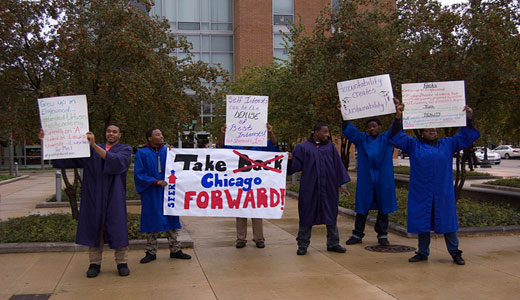
CHICAGO – This is a city of polarizing contrasts: a gleaming downtown of corporate offices and luxury high rises subsidized by taxpayers while working class neighborhoods, especially African American and Latino communities, are neglected.
Bitterness is growing at the austerity, privatization and anti-labor policies of Mayor Rahm Emanuel that has left in its wake residents struggling with poverty wages, underfunded schools and health facilities and other services and the disappearance of affordable housing.
The bitterness erupted as thousands gathered Oct. 15 at the UIC Forum to launch new efforts to “Take Back Chicago.”
With Emanuel set to introduce a new budget to city council, the crowd called upon state representatives and aldermen in attendance to pass a people’s budget. They expressed their support for taxing the rich, a $15 per hour minimum wage, funding schools and mental health clinics, ending privatization and building affordable housing.
“Sixty-six percent of corporations pay no Illinois corporate income tax,” said Chicago Teachers Union organizer Brandon Jackson to loud boos. “But $6 billion could be raised if they would pay up and we wouldn’t have to close mental health clinics or shut down schools!”
The state is experiencing a revenue crisis and can’t fund vital services or its pension obligations.
In reaction, a statewide coalition of labor, community groups, agencies, advocates and students is pushing for an amendment to the state constitution that would replace the current flat tax with a graduated tax. Hundreds of thousands of signatures are being collected to present to the state legislature, which must vote to place the amendment on the election ballot.
Legislators at the rally promised to support the legislation.
Public schools have taken the brunt of Emanuel’s policies. This year 50 schools were closed, the largest in U.S. history, and additional millions of dollars were then slashed from schools already staggering from underfunding.
“My high school was cut $4 million and many teachers were laid off,” said Mauro Ortega of the Brighton Park Neighborhood Council. “Altogether $7 million was cut from the neighborhood schools. How are we supposed to learn? Meanwhile Emanuel is giving $50 million to DePaul University!”
The money given to DePaul is part of millions in public funds being looted through a legal scheme called Tax Increment Financing (TIF) whereby property tax revenues earmarked for schools and parks is diverted to projects championed by wealthy interests. The gathering called for reform of the TIF program.
Last week the Grassroots Collaborative, a major organizer behind the rally, released a study showing that despite all the TIF money and other public funds being poured into downtown development, three-quarters of the jobs created were going to suburban residents, leaving especially African American and Latino workers behind.
The crowd also demanded an elected school board to replace the current one, hand picked by the mayor, which is made up of billionaires and representatives of the banks and finance industry.
Elected officials at the rally vowed to support TIF reform and an elected school board.
Demonstrators said affordable housing and a minimum wage hike were crucial to making the city livable for all. “Three months ago I became homeless after I lost my job,” recalled Pastor Charles Austin of the Chicago Coalition for the Homeless. “It broke up my family. Many people have to work two or three jobs and still can’t afford housing. “
Austin said there were 2,500 single room occupancies (SROs) lost over the last year to real estate developers profiteering, often called “gentrification.” He called upon the city council to support a community housing plan authored by a coalition of community groups and housing activists that would create affordable housing by investing in vacant and foreclosed properties and existing SROs.
The call for a living wage got a standing ovation from the crowd. The rally was held on the same day a national study was released that revealed 52 percent of fast food workers receive some form of public assistance.
Mina Waite of Action Now said poverty remains an issue no politician wants to address. “A family can’t survive on $17 thousand per year without public assistance. Poverty is a result of the system that allows the rich to get richer at the expense of working people. A minimum wage of $15 per hour sounds reasonable to me.”
To which elected officials there all voiced support for a $15 per hour minimum wage.
The rally kicked off new plans to “take back Chicago block by block.” Hundreds signed up to join teams to register new voters and build neighborhood political clout with the aim of electing a pro-people mayor and city council and passing progressive legislation in Springfield.
Photo: Earchiel Johnson/PW












Comments